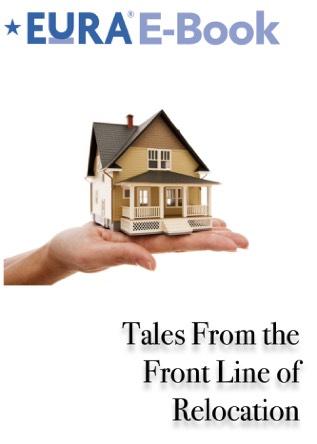
23 minute read
Legal Update
All Things Legal ………. April 2021 - Gordon Kerr
As I write this, it’s far from clear what the summer months will bring us. Holiday plans remain uncertain and the same can be said about international assignment planning in many organisations. Relocation activity will pick up and, in the meantime, I know that many relocation businesses are taking steps to ensure that they are in the best possible shape to deliver service excellence as soon as the world starts moving again.
EuRA is playing its part in these preparations by offering members a great programme of Briefings and access to the excellent training contained in the MIM Modules. Legal training has recently been extended to the provision of tailored Training Workshops for member firms and a Dispute Mediation Service has just been launched, with the aim of helping members to resolve business disagreements in a way that can preserve good ongoing relationships. More information on these new services is provided below.
I had the pleasure recently of joining Mima Hillier for a EuRA Briefing on insider fraud. Employee embezzlement is a serious problem, and this was an opportunity to discuss various common forms of fraud and, importantly, the practical steps which relocation businesses can take to reduce fraud risks. I can strongly recommend Mima’s MIM Fellowship case study on “Fraud and Fraud Prevention”, which is available on EuRA’s website. In terms of legal updates, I have picked up several items which I think will be of interest to EuRA members: • Data Security 1) Protecting your business from hackers using a pen test 2) Are your homeworkers secure? • GDPR – do relocation companies need a
Representative in the EU and the UK? • Brexit – are financial jobs moving out of London? • New online legal services for
EuRA members: 1) Dispute
Mediation Service and 2)
Legal Training Workshops. If there is a particular legal topic that you would like me to cover in a future edition of The EuRApean, please feel free to contact me anytime.
Data Security (1): Protecting your business from hackers using a pen test
Relocation Service Agreements often require RMCs and DSPs to demonstrate the security of their IT systems by means of penetration testing – usually referred to as “pen testing”. A requirement to carry out regular pen testing can be viewed as an imposition, but these tests can also deliver benefits for your business. Here is a quick overview of the main issues.
What is pen testing?
Pen testing is the process of an external IT specialist trying to gain access to your system or web applications by identifying weaknesses that can be exploited. The tester is examining your IT system in just the same way as a hacker would. Pen testing can also include non-technical vulnerabilities, such as assessing the awareness of your employees in relation to methods used by criminals to discover passwords.
• Why is pen testing important?
The key benefit of a pen test is that it gives you the opportunity to identify where an unauthorised person could gain access to your system before somebody is able to take advantage of that opportunity. Your business is made aware of the specific risks that it faces, and you can take steps to improve your cybersecurity in the areas that really matter.
• How much will it cost?
The cost of a test varies according to: • Size of the application and the network • Number of IP addresses to be scanned Gordon Kerr EuRA Strategic Consultant Legal gordonkerr@gklegal.co.uk
• Number of data collection points for your system. The test will typically last between one and three days, at a cost that is likely to be between £800 and £1,200 per day.
• Next step?
Before going ahead with a pen test, you should ask for a clear scoping document which details: • What the tester is going to look at • How they are going to look at it • The cost • How long the test will take. In particular, you should check that you are being provided with more than a “vulnerability report”, which highlights issues and risks, but will not detail how you can fix these things. You will normally want a tester who can give you a full, detailed report, explaining what the risks are and what you can do to remove these risks.
Data Security (2) – Are your homeworkers secure?
It’s clear that, during Covid lockdowns, many relocation businesses and their employees have adapted to, and valued the benefits of, remote working.

These can include: • A better work-life balance for employees. • Increased job satisfaction. • Improved productivity. • A positive environmental impact.
Recent research indicates that, across most business sectors, companies plan to continue to allow employees to work remotely, at least part of the time, after the pandemic subsides. But while remote working may have benefits for organisations and their employees, there are also potential downsides in terms of information security and data privacy. The sudden impact of COVID-19 meant that the shift to working from home was largely unplanned. Consequently, there has been a surge in security breaches directly related to remote working.
One of the challenges is that more homeworking means that the boundaries between our personal and professional lives have become blurred. Employees are likely to use company issued devices for personal matters including: • Personal email. • Financial transactions. • Online shopping. • Personal social media.
It’s also clear that some employees use personal devices for work related activities. Either way, this mixing of the personal and professional exposes organisations to increased cybersecurity risk.
These risks arise in a number of ways:
Home networks
Home networks are often less secure than the connections employees would normally use in the office. For example, routers and “internet of things” devices that still operate with default login credentials are vulnerable to attack. As a result, home networks are far more likely than corporate networks to have at least one family of malware. Cloud-based secure web gateways may be available to home-based employees but enforcing their use may be a challenge for your business.
Outbound emails
More remote working means more outbound emails, which means more email related data breaches. According to the ICO (the UK’s data protection authority) misdirected emails are the top cause of security incidents. Many organisations have suffered email data breaches in the last 12 months, with the main causes including: •Incorrect recipients added. •Incorrect files attached. •Encryption not used. •Errors using Bcc.
Phishing attacks
Attacks continue to become more sophisticated and often target home workers with messages apparently from their senior leadership team or IT Support.
Inadequate Training
Most data breaches and security incidents are caused by human error and this risk increases when we work from home. Businesses will usually provide information security and data privacy training to their employees, but often this training fails to focus on the specific threats related to working from home. Given the surge in security breaches linked to remote

working, standard, generic data privacy training is often inadequate.
Tips to improve the security and privacy behaviours of home-based employees
• Tailor training to give people relevant and useful support and guidance specific to home working. • Acknowledge the overlap between the personal and professional. While you are helping people keep corporate data safe, help them to keep themselves and their family safe online too. • Help employees to use the tools available to them (such as
VPNs and encryption) to keep data secure. • Encourage employees to speak up if they have an issue or concern. • Make your training short and to the point while increasing its frequency.
GDPR – Do relocation companies need a Representative in the EU and the UK?
Relocation companies sometimes find it difficult to establish whether there is a legal requirement, under the GDPR, to appoint a Representative in the EU and/or the UK. The position has become more complicated following Brexit, so here is my attempt to summarise the current law!
The starting point is to be aware if any of these descriptions apply to your business: 1. If you are a UK-based controller or processor, with
no offices in the EU but offering services to individuals in the EU – you may need to appoint a Representative in the EU; 2. If you are a controller or processor based outside the
UK, with no offices in the UK but offering services to individuals in the UK – you may need to appoint a
Representative in the UK; 3. If you are a controller or processor, with offices in neither the UK nor the EU, but offering services to individuals in the UK and EU, you may need to appoint
Representatives in both the
UK and the EU.
There is an important exception to the need to appoint a Representative, which applies where the processing is “occasional”. But, for the processing to be considered occasional, it means that a) it must not be carried out regularly, and b) it occurs outside the regular course of business.
Businesses appointing a Representative should bear the following in mind: • A Representative needs to be established in the country
where some of the individuals whose data are being processed are located; • The appointment must be in writing; • A Representative can be an individual or a company, but they must have the ability to represent you when it comes to meeting your obligations under the GDPR. The ICO (UK) suggests, for example, that a law firm, consultancy or private company could act as
Representatives and recommends using a service contract.
A US-headquartered relocation company needs to consider whether it has to comply with both the UK GDPR and EU GDPR, including the need to appoint Representatives in both the UK and EU. If the US entity has UK and EU subsidiaries, these are likely to qualify as the US entity's Representatives. If the only subsidiary is located in Switzerland, for example, which is outside the EU, this would not qualify as a Representative.
This is a complicated area of the GDPR. If you think that your business may be under an obligation to appoint an EU or
UK Representative, it is worthwhile obtaining legal advice from a law firm with specialist expertise in data protection law.


Brexit – are financial jobs moving out of London?
On March 2nd, The Times’ headline screamed out: “Nearly
Half of UK Finance Firms Have Moved Jobs to the EU after Brexit”. A dramatic headline, but the facts behind it are more nuanced. According to EY, the current estimate of financial sector jobs which have moved from London to financial centres in the EU, as a result of Brexit, is 7,600. This may look like a large number, but it is a fraction of the figure predicted at the time of the Brexit referendum and is dwarfed by the City of London’s total financial jobs figure of 170,000.
The Times’ headline was actually based on another bit of research by EY which, by analysing the public statements made by 222 of the largest Londonbased financial services firms, concluded that 43 per cent of businesses in the sector have moved or plan to move some of their operations or staff to the European Union.
According to this research, the EU cities benefiting from this relocation activity are: 1. Dublin (36 companies) 2. Luxembourg (29) 3. Frankfurt (23) 4. Paris (14) 5. Madrid (8) 6. Amsterdam (8) 7. Brussels (6) 8. Milan (5)
Many of these new or extended offices are being established for technical, compliance purposes and have not involved any significant movement of employees. So, despite the headline, there is no sign yet of large-scale relocation of financial jobs out of London.
New Online Legal Services For EuRA Members
I’m pleased to be working with EuRA in the launch of two new online legal services: firstly, a Dispute Mediation Service and, secondly, Legal Training Workshops.

The Dispute Mediation Service provides members with a low-cost method of resolving disputes, whether these arise with other relocation firms, with clients or with suppliers. A particular benefit of mediation is that, unlike a dispute involving threats of court action, it is possible for the parties to maintain a good relationship.
The process is voluntary, speedy and completely confidential. This is how mediation works:
EuRA’s new Legal Training Workshops are designed to support the training needs of member firms, and can be tailored for managers or groups of employees. The workshops, which I deliver on Zoom, combine learning with group discussion. Here are some of the topics which can be covered:
• Data Protection
• How do we ensure that we are
GDPR-compliant? • What data security measures do we need in place? • What are the legal rights of our customers and employees?
• International Relocation
Contracts
• How to review a relocation services contract • Financial and non-financial clauses • Revising unreasonable clauses
• Anti-bribery
• Bribery Act and Foreign
Corrupt Practices Act • Bribery risks in the relocation supply chain • Practical steps to avoid bribery risks
• Dispute resolution
• Common disputes in the relocation industry • Methods of negotiating an amicable settlement •Alternatives to arbitration and court action
The cost of a two-hour workshop is €600 plus VAT. Each workshop is worth 25 credits towards EuRA Academy MIM and MIM+ certification for all attendees.
For further information on either of these new legal services, please contact me at gordonkerr@gklegal.co.uk or call +44 (0)7850 080170.
The Legal & Tax Report is produced for The EuRApean by Gordon Kerr, EuRA’s Strategic Consultant - Legal Services. Gordon can be contacted at gordonkerr@gklegal.co.uk.
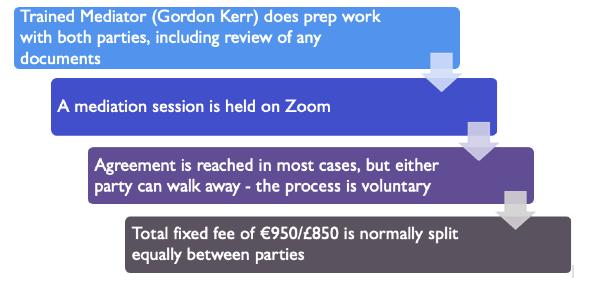
EuRA’s YouTube Channel #eurabriefing
CLICK HERE TO VIEW
We’re running EuRA Briefings twice a month and they’ve proved really popular! They’re available to members only for the first month and then made public on our YouTube channel.

EuRA Briefings - Just Click on the Link to View the Session • Immigration Symposia Part 1 - The Impact of Brexit • Immigration Symposia Part 2 - The Impact of the Biden Administration • Corporate Housing Part 1 - 2021 - What to Expect from Business Travel • Corporate Housing Part 2 - Trust & Transparency; Voice of the Customer with RMC's • Innovation from Disruption in the Global Workforce • Fraud Prevention in SME's • Learning & Development; The Importance of CPD • Room 101 Episode 1! • The Precision Model - A New Approach to Communication Training And coming up: • All the sessions from the Spring Summit will be available in June! • Room 101 Episode 2 - if you’d like to take part please email Dom Tidey
Also we have regular Member Video Podcasts, catching up with our amazing members across the world - if you’d like to take part email Dom Tidey You can watch them all on our YouTube Channel
#eurabriefings #euraintercultural #eurawillbetogetheragain
We have been working hard to increase online recognition of our industry through our social media presence.
On LinkedIn we have a feed page, the “Official EuRA Members Group” our “Legal Peer to Peer Sharing” Group and an “EGQS” Group. We post links to all our briefings and interviews on LinkedIn, the EuRA Facebook Page, Twitter and Instagram. If you have anything you would like to share please go right ahead! The more we can share, acknowledge and highlight the amazing work of our industry all over the world, the better we can create recognition!
Please follow EuRA’s presence all the links are below!

https://www.linkedin.com/company/eura https://www.facebook.com/eurarelocation
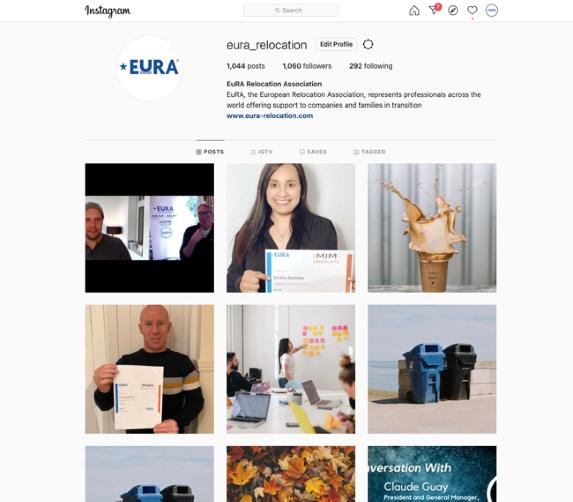




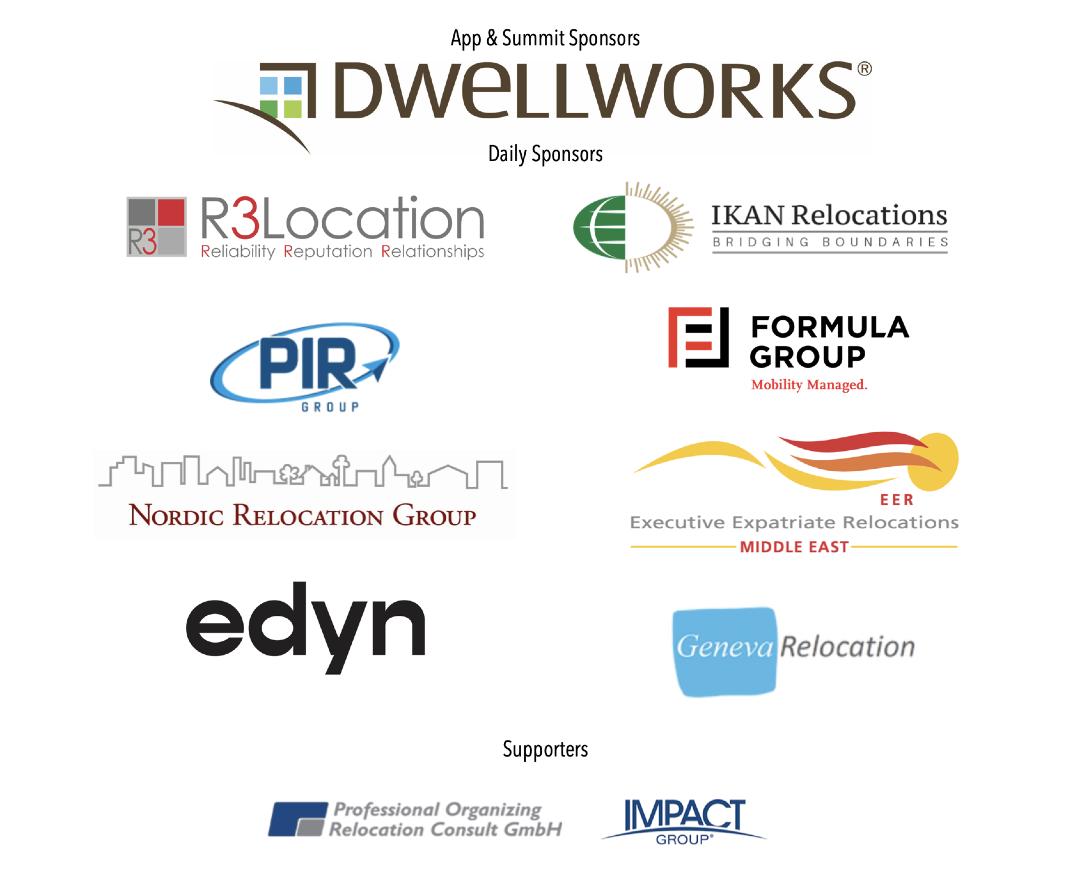
#euraspringsummit
We’ve coined a new phrase here at EuRA… “Virtual Conferences… twice the work and half the fun!”
But they are a great way to keep us all connected and up to date with the changes in mobility which have been so monumental since the start of the pandemic.
The Spring Summit is our third event and having learnt from you, we are running a smaller programme over a longer time period. Over 10 days there will be one session per day plus an Ignite, plus an opening address from the fabulous Frances Edmonds, a closing keynote from the brilliant Jon Harman and a chance to network with speakers and each other via the App!
The Summit will be delivered through our brilliant Whova App just like the last two and is free to all delegates of Seville 2022. Each day a member of the EuRA Board will act as host
If you are registered there is no charge and you should have received your login - if not contact Briony Horwood

Spring Summit Programme
Monday 10 - Host Michèle Bramstoft Daily Sponsor - Dwellworks 16:00 - Opening Keynote Frances Edmonds 16:15 - Diversity & Inclusion - Laura Levenson
Tuesday 11 - Host Isabel Cudell Daily Sponsor - Edyn 16:00 - Sustainability in Corporate Housing 17:00 - Ignite - Lorna Keen
Wednesday 12 - Host Alistair Murray Daily Sponsor - Nordic Relocation Group 16:00 - Mobility Report - Carl McLean 17:00 - Ignite - Tracy Kautzmann
Thursday 13 - Host Pierre Jeronimo Daily Sponsor - Formula Group 16:00 - Working with Direct Clients 17:00 - Ignite - Elizabeth Sawyer
Friday 14 - Host Isabelle Prémont Daily Sponsor - PIR Group 16:00 - Sustainability in Mobility 17:00 - Ignite - Rob Fletcher 17:05 - End of the Week Wind Down!
Monday 17 - Host Simon Robins Daily Sponsor - Ikan Relocation 16:00 - Gotta Get it Right - Contracts & Compliance 17:00 - Ignite - Paul Soley
Tuesday 18 - Host Irina Yakimenko Daily Sponsor - R3Location 16:00 - Immigration Update 17:00 - Ignite - Dima Lorenz
Wednesday 19 - Host Sophie Rehberg Daily Sponsor - Executive Expatriate Relocations 16:00 - Move Management 17:00 - Ignite - Miriam Duignan
Thursday 20 - Host Andrew Scott Daily Sponsor - MIM Training 16:00 - RMC DSP Forum 17:00 - Ignite - Ben Carter
Friday 21 - Host Susana Bourne Daily Sponsor - Dwellworks 16:00 - The RFP Process - Alistair Murray 17:00 - Closing Keynote - Jon Harman 17:30 - Goodbye from the Board with Booze
A full detailed programme is on the Whova App so download yours today!!

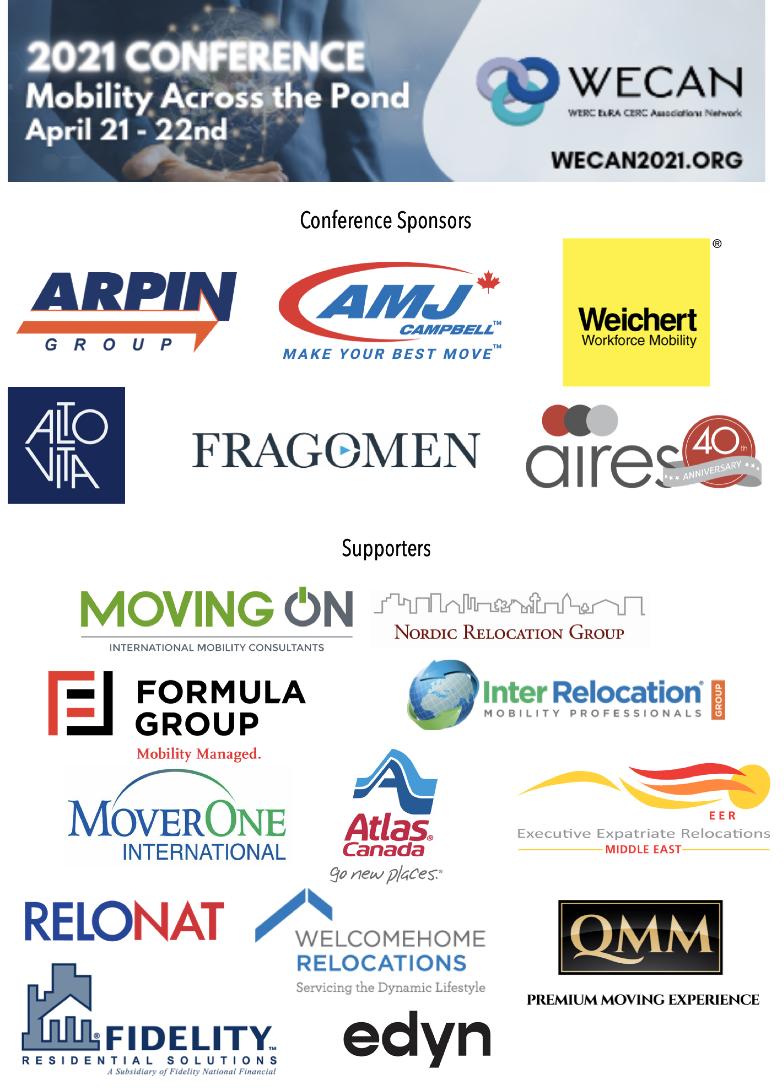
#wecansummit. Tad Zurlinden
It was only 3 months ago that the idea of a joint event was tabled and thanks to Dom it became know as WERC, EuRA, CERC Association Network (WECAN). Within a few days we had a title ‘ Mobility Across the Pond’ and a programme mapped out and before long the speakers were enlisted.
We of course suggested the brilliant Frances Edmonds and she did a fabulous job both opening and closing the summit and interviewing Claude Guay, the President & General Manager of IBM Canada.
During the Opening, Frances used the mnemonic WECAN;
W - wellness and wellbeing E - expectation C - culture A - agile N – network
My opening comment was “as individual associations we can achieve a lot but as three global organisations ‘we can’ bring greater benefit to our members” and that was reflected in the content of the event.
Following Claude’s interview and the subsequent Q & A the second session asked whether mobility was a pre-requisite of acquiring global savvy? The answer was that without intercultural skills and utilising more local talent businesses would face greater problems. Binwa Sethi comment that “Compassion, Curiosity and Courage” summed up what was necessary in a global assignee.
We opened the second day with a session on migration and mobility. The most fascinating outcome of this session was that the pandemic seems to have focused the minds of governments globally on the need for more open discussion on many different topics.
The final session looking at a new framework for migration and mobility, looked at the need for more co-operation globally on tax, social security and migration policy and finally looked at the issue of vaccination certification.
Overall the WECAN Summit was a tremendous success and I hope that we are able to repeat this for other regions of the world later in the year.
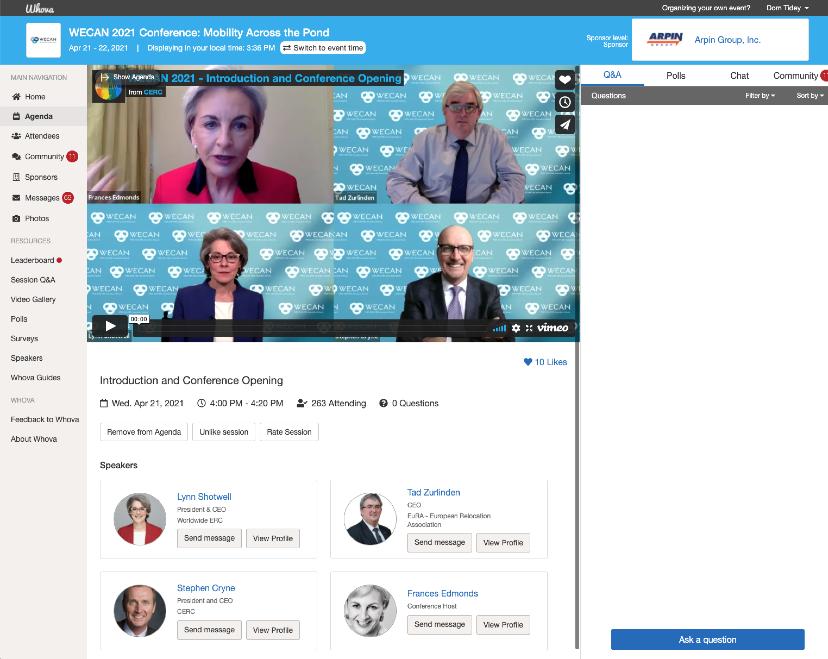
The Launch of the UK’s First All Party Parliamentary Group for Relocation

Tad Zurlinden reports on a promising development in the UK, where he has led the launch of a Parliamentary Group in Westminster to represent professional relocation services to support the sector and the economy.
I’ve been involved in the relocation sector for many decades, and I’ve often wondered; should we be doing more to work with the politicians? Well, I decided that the answer was ‘yes,’ and I did something about it. So, after a process of engagement that started last year with the British Parliament in Westminster, we have succeeded in establishing the All-Party Parliamentary Group for Relocation. This is an officially recognised Group, that has formal status in Westminster.
The first meeting elected its Chair, Sir Robert Syms MP, and other Officers – all of them British Members of Parliament. It’s the first time in the relocation sector’s 40-year history that we’ve had a formally constituted All Party Group in the British Parliament. I see it as a huge step forward and I’m delighted we have such high calibre officers, particularly our new Chair, Sir Robert Syms, who made the Group’s formation possible. We already have a good idea of the key areas of work we need to cover. These include visa issues, the tax threshold for relocations which has remained unchanged for decades, some other policy areas and the ever-present challenge of Covid-19 restrictions that affect the whole of Europe and world. I’m determined to make sure we in the employee relocation sector plays our part in getting the economy moving, by getting employees moving again. The best way for us to do that is to work with politicians to see what we can do together to achieve this.
The Association of Relocation Professionals here in Britain is now getting on with the task of working with Government, and specifically I mean the Department for International Trade. The aim is to build our involvement into a natural alliance, that acts as a major force to assist global business restart the process of getting its staff to where it needs them. There’s so much to do and I know relocation is set to play a truly central role in how companies manage the people it must move. This All-Party Group is a vital component as we make this happen.
What we’re doing – and learning – in the UK could help you do the same in your sphere of operation. Naturally, the UK team is happy to help by sharing what we’ve learned so far. Building our status at Government level is an exciting journey, and one the relocation sector can make throughout Europe by sharing best practice and building on it. I hope we in the UK can assist you in gaining the same kinds of relationships we’re building in Westminster. If you want to talk about it, just give me a call!
Contact ARP on 01379 651671 and on our website

We are working hard to get Relocation Recognition and one way of doing this along with our YouTube Briefings and Virtual Summit sessions is by putting together an EBook with anecdotes that really show the great value of what we do in our industry! Below is an example of the kind of story we’re looking for that really highlights what a solution focussed group we are - thanks to Marina Rych of ABEA in the Ukraine for sending this in.
During the quarantine, there were many memorable situations. The unusual period required unusual actions and solutions. Let us share with you a funny story that happened to an ABEA lawyer at the very beginning of isolation. Mid-March 2020. We carefully warned all ABEA customers about the government’s decision regarding self-isolation, mentioned all necessary requirements and informed about the closure of state institutions. In addition, to make a full picture, we notified which state offices continued their work and what could be done during the quarantine period. We also wrote letters individually to each client describing deadlines for their documents. If you want to use the quarantine time to extend your work permit and temporary residence permit, ABEA will be always at your disposal. One of the CEOs of a large international company decided not to waste time after the quarantine. We discussed all the pitfalls, prepared the documents, agreed on the dates – everything was according to the procedure. The day before the meeting, we reminded the client about the visit, what documents were needed to bring, and most importantly, about a new hygiene rule – wearing masks. All visitors must wear mask during the quarantine at any government office. However, as it often happens, the client arrived, brought the documents and forgot the mask. ABEA specialists rarely get lost in such unexpected situations. Instead of sending the client to bring a mask and postponing the meeting, the lawyer quickly ran to the pharmacy to buy a new mask in order to apply on time. As quarantine had just begun, the hype concerning masks was incredible and there was not a single in drugstores. Let us kindly remind the policy of ABEA – we are not looking for excuses; we are looking for opportunities. The lawyer bought a bandage, asked for scissors at the pharmacy and sewed a mask right there. Not being a professional tailor, the lawyer sewed a mask, periodically trying on herself. Do not forget, we could not lose time - the CEO of a leading international company was waiting on the street, and time for a visit to a government office was running out. A pleased lawyer leaves the pharmacy with a solution in the form of a handmade mask. The client gratefully tries it on and … it is absolutely small! There are different people, but we thank the higher power, that our client has a sense of humor, respect for lawyer’s efforts and a great desire to apply for documents. Somehow, the client attached a small mask to the glasses in order to follow the hygiene rule – the mask covered a nose and mouth. The application took place! Moreover, the CEO took some pictures, told his friends, colleagues a story of his application and was very pleased with the situation. Thanks to a creative approach of the ABEA lawyer and the ability to see a way out, a small trouble ended up like a fun story to our piggy bank.
